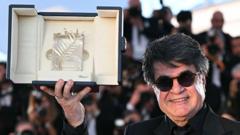Iranian filmmaker Jafar Panahi's win of the esteemed Palme d'Or award at the Cannes Film Festival for his film "It Was Just an Accident" has ignited a diplomatic conflict between Iran and France. Following his achievement, French foreign minister Jean-Noël Barrot characterized Panahi's victory as a significant stand against the oppressive Iranian regime. In response, Iran's foreign ministry spokesperson, Mohammad Tanhaei, criticized Barrot's comments as "insulting" and "unfounded," labeling them as blatant interference in Iran's domestic affairs.
During the meeting with the French ambassador, Tanhaei expressed that such remarks were irresponsible and that France held no moral ground to comment on the situation in Iran, referencing France's perceived inaction regarding the Palestinian situation. He demanded a formal explanation from the French government, prompting the envoy to assure that the message would be conveyed to Paris.
Jafar Panahi's career has been marred by a series of legal issues due to his outspoken criticism of the Iranian government. He was sentenced to six years in prison related to anti-government protests and has faced a 20-year ban on filmmaking and travel. Despite these restrictions, he managed to complete "It Was Just An Accident" in secrecy, illustrating the struggles of ordinary Iranians confronting the regrets of their past due to the Iranian government's oppressive nature.
In a poignant acceptance speech at the Cannes event, Panahi called for unity among Iranians, stressing the need for freedom of expression regarding personal choices, including attire. After a lengthy absence from international festivals, he affirmed plans to return to Iran post-Cannes to continue his work in cinema, leaving many to wonder about his next steps under the current political climate.
During the meeting with the French ambassador, Tanhaei expressed that such remarks were irresponsible and that France held no moral ground to comment on the situation in Iran, referencing France's perceived inaction regarding the Palestinian situation. He demanded a formal explanation from the French government, prompting the envoy to assure that the message would be conveyed to Paris.
Jafar Panahi's career has been marred by a series of legal issues due to his outspoken criticism of the Iranian government. He was sentenced to six years in prison related to anti-government protests and has faced a 20-year ban on filmmaking and travel. Despite these restrictions, he managed to complete "It Was Just An Accident" in secrecy, illustrating the struggles of ordinary Iranians confronting the regrets of their past due to the Iranian government's oppressive nature.
In a poignant acceptance speech at the Cannes event, Panahi called for unity among Iranians, stressing the need for freedom of expression regarding personal choices, including attire. After a lengthy absence from international festivals, he affirmed plans to return to Iran post-Cannes to continue his work in cinema, leaving many to wonder about his next steps under the current political climate.


















